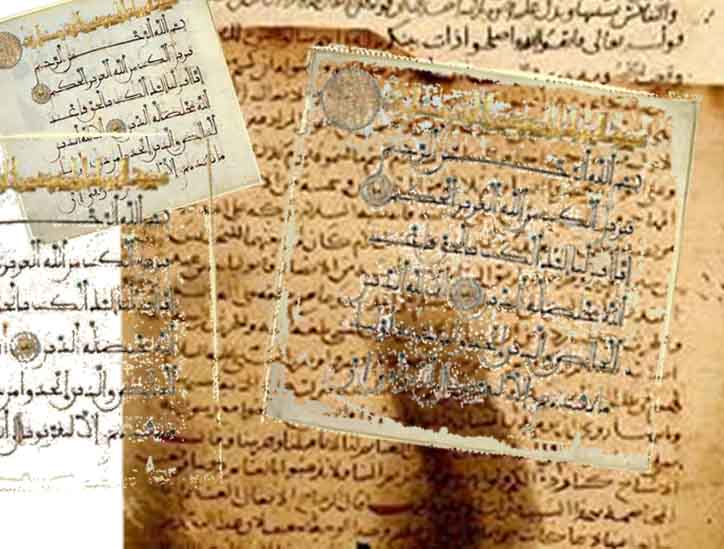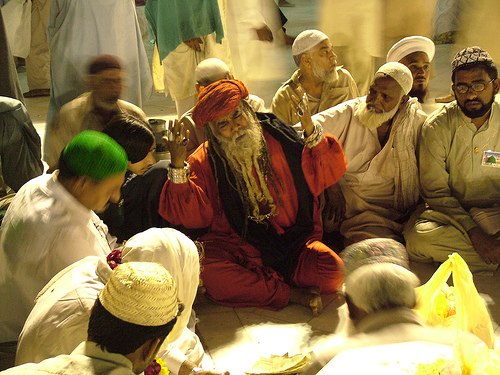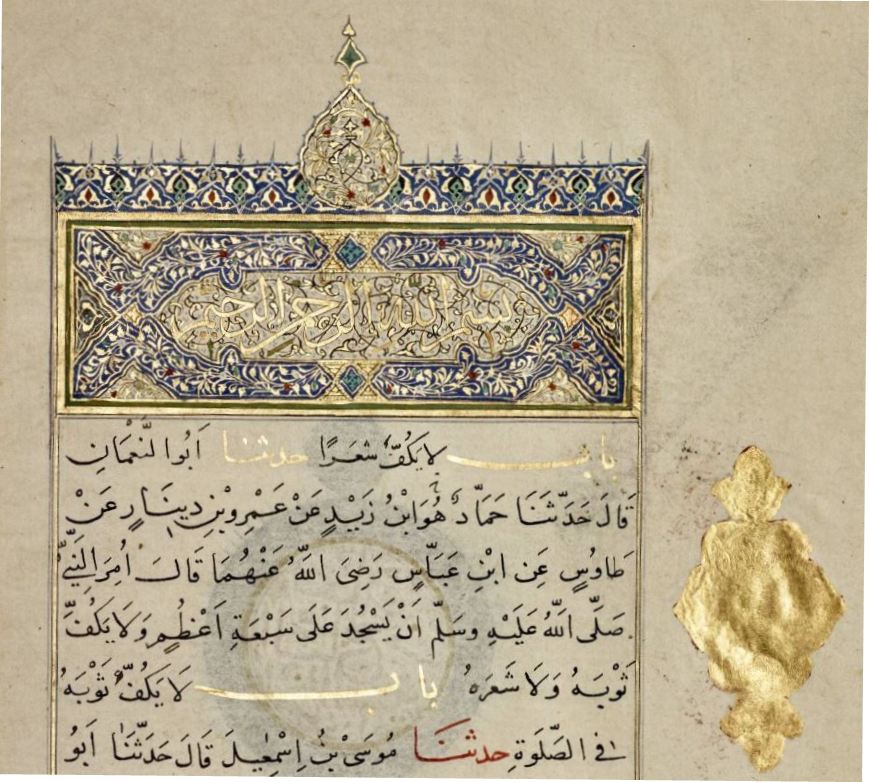
Muhammad the Messenger did not communicate his religious and ethical call without support from heaven or Revelation, however it was that he communicated with the next world, and whatever is meant by the concept of Revelation, whether this be a Revelation in the sense of an interpretation, or a conceptualisation. Or, indeed, whether it constitutes an ascending proposition - communication with the world of the unseen - which caused him to pour forth signs of divine illumination which the Messenger then translated into expressions and verses. Or, again, whether this be a downward proposition - that is, direct textual messages according to the traditional, recognised concept of Revelation.
LET US CONTENT ourselves at this juncture to speak of Revelation as a completed act, and one which believers consider to be the ever-existent Word of God. That is, something far removed from the ambitions and the efforts of the ‘Hashimite Party’ – which Sayyid Mahmud al-Qimny speaks of in his book: ‘The Hashimite Party and the Foundation of the Islamic State’ – in the psychological preparation and equipping of Muhammad since childhood to undertake the task of delivering the Message.
The Messenger was aware of the reasons why the ethical and religious calls made by his hunafā’[1] predecessors failed. It was thus incumbent upon him to embark upon the path of Revelation as a binding authority, a path which the hunafā’ before him had not taken, especially as Allah was not unknown to the societies of the Arabian Peninsula, despite the polytheism that had marred this relationship. Many Qur’ānic verses speak of the polytheists’ knowledge of God and their indirect connection with Him:
And if thou wert to ask them: Who created the heavens and the earth, and constrained the sun and the moon (to their appointed work)? they would say: Allah. How then are they turned away? [Qur’ān XXIX,61];
And if thou wert to ask them: Who causeth water to come down from the sky, and therewith reviveth the earth after its death? They verily would say: Allah. Say: Praise be to Allah! But most of them have no sense [Qur’ān XXIX,63];
If thou shouldst ask them: Who created the heavens and the earth? they would answer: Allah. Say: Praise be to Allah! But most of them know not [Qur’ān XXXI,25];
And verily, if thou shouldst ask them: Who created the heavens and the earth? they will say: Allah. Say: Bethink you then of those ye worship beside Allah, if Allah willed some hurt for me, could they remove from me His hurt; or if He willed some mercy for me, could they restrain His mercy? Say: Allah is my all. In Him do (all) the trusting put their trust [Qur’ān XXXIX,38];
And if thou (Muhammad) ask them: Who created the heavens and the earth, they will surely answer: The Mighty, the Knower created them; (9) Who made the earth a resting-place for you, and placed roads for you therein, that haply ye may find your way [Qur’ān XLIII,9];
And if thou ask them who created them, they will surely say: Allah. How then are they turned away? [Qur’ān XLIII,87].
Through these verses we can see how the polytheists of Mecca knew much about Allah and how their relationship with Him was a close one, albeit disfigured by the stamp of polytheism. This phenomenon defined the Messenger’s primary task and the essence of his call: the transformation of the relationship between the individual believer and his Creator into a direct relationship unmediated by an image or an idol or a Messenger or even a Book – let alone two books or two ‘Revelations’ – in other words, his primary task was to impose tawhīd as a doctrine of faith. The second task was to perfect morals: “I was sent in order to perfect the best of morals”[2] as the Messenger said describing his second task.
The Qur’ān was not intended to take on the attribute of sanctity
How far did the Messenger go in carrying out these two tasks?
Historically the Prophet was able to shatter the idols around Makka and other sites in the Arabian Peninsula. Yet polytheism is basically linked in its thought and in its evidence with the fact that among the polytheists of Mecca were some who fashioned their idol from dates and then proceeded to consume this whenever menaced by hunger. So the claim concerning the success of the Prophet’s first mission – the establishment of the pillars of monotheism – is something that is tainted on an intellectual level. Verbally and morphologically speaking, the mediation relationship that bound together God and the Muslim came to an end before he declared his Islam. However, the establishment of the content of the new relationship – monotheism – was not an easy matter, just as it was not easy to root out so swiftly the content of the ancient relationship.
Even today we can see many aspects which may be considered ‘polytheistic’ from the monotheistic religious point of view, aspects such as the blessings invoked upon the pious saints, or the request for their intercession in the belief that they have the capacity to effect good or ill. Similarly, many religious denominations have appeared that practice customs and rituals of worship that find no support either in the foundational Text – the Qur’ān – or in the customs, practice or rituals performed by the Prophet as detailed in his biography or the sound hadith.
Those who found difficulty in accepting the doctrine of monotheism and faith did not return to the same pagan rituals of polytheism and the dedication of offerings to their ancient gods Hubal, Allāt, al-ʽUzzā and others – particularly when the new belief enabled them to occupy high positions that they could not have dreamt of occupying before. Scholars such as Muhammad Saʽīd al-ʽAshmāwī and others point to the fact, for instance, that Abū Sufyān was not deeply convinced by the doctrine of Islam and they demonstrate that his Islam amounted to little more than lip service, rather than one informed by deep conviction. They also note that his conversion to Islam was in the first place carried out under duress, and that it was only later that he came to look favourably on Islam in anticipation of the first promises of booty granted to him by the Prophet as a privilege granted him over many of those who preceded him in embracing Islam both verbally and practically out of conviction. This subsequently impacted negatively upon the sons of Abū Sufyān when they assumed the reins of political power. There are many other examples similar to Abū Sufyān but history has not recorded details of their roles or the influence they wielded, possibly since they did not play any significant historical role.
These figures, on both the political and societal levels, played a role in modulating the doctrine of monotheism and in importing polytheistic doctrines in new guises that took on more of an intellectual than a material stamp. In this new form of polytheism authority – that is, of rulership and of the ruler – took on an aspect of sanctity as the ‘shadow of God on earth’. Other attributes were thus added to the Godhead: the Qur’ān, the Prophet and then the Hadith in a general sense. Added to these were a number of attributes specific to the many Islamic denominations and sects, such as the ‘Epistles of Wisdom’ and the Al-Munfarid bi-Dhātih of the Druze, or the infallibility and sanctity of the Imams of the Jaʽfarī Shīʽa, or the Peacock Angel – ʽAzāzīl – of the Yazidis. Many Sufi ‘pathways’ came to be added to the mix, in each of which a saint enjoys the attribute of reverence and holiness.
On top of these may also be added many folk customs, traditions and beliefs practiced on a daily basis and which orthodox religion considers polytheistic, such as: magic, fortune-telling and divination, the belief in the stars wielding influence over the life of a man, the calling upon the saints for aid, swearing oaths other than by God, and the hanging of amulets and beads to avert the evil eye, effect a cure or bring good luck or provide relief from tribulations. Examples of distortion and deviation from the path are as many as the number of Islamic denominations and sects that are in existence. If we imagine Islam in its original, monotheistic version as a straight line or pathway, we have to say that everyone – whether on the level of sects and denominations or on the level of individuals and communities – has deviated from this pathway and the only criterion by which their Islam can be judged is their relative distance or nearness to it.
From the Islam of the Qur’ān to the Islam of the Hadīth.
The Qur’ān was a message before it was a book, and it was not intended that it should take on the attribute of sanctity, since it constitutes a discourse intended to rectify the state of polytheism and consolidate the principles of monotheism, to establish the transcendence of the Creator, and to perfect morals – all in a flexible doctrine that later generations could derive benefit from in devising solutions to contemporary problems. That is why, among all the descriptions given of the Qur’ān, we do not come across any that depict it as something ‘sacred’, or imply as much from describing the sanctity of its Messenger. The doctrinal authority which the Qur’ān instituted was the authority of a changing real world, not the authority of a Text, else there would have been no place for verses that abolish earlier verses. If the authority resided in the Text there would only be one single Text.
If the authority resided in the Text, there would only one one single Text
This is also the case with the Prophet, for he describes – via the Qur’ān – how before being a Messenger or a Prophet he is but a man, and depicts himself in humble terms as ‘the son of a woman who ate jerked meat in Makka’. This is supported by other passages in the Qur’ān and the (more reliable) Hadith that affirm that the Prophet was not someone who was considered holy in any way. This ‘holiness’ attribute is something which the ‘Wahhabis’ in Saudi Arabia and their followers in other Islamic countries expend all their effort in repudiating, out of a belief that it constitutes a form of polytheism, and in their defence of the purity of the monotheistic creed – albeit in ways that defy the spirit of the Prophet Muhammad’s own teachings.
Since the Messenger was aware of the nature of the distortion that assailed earlier divine messages and of the means by which they become estranged from their first, intended content, he forbade the collection of hadith referring to his words and acts. Similarly, his Companions Abū Bakr, ‘Umar ibn al-Khattāb, ‘Uthmān and ‘Alī followed his example. ‘Umar ibn al-Khattāb, for instance, burnt some of the hadith, censured Abū Hurayra and threatened him with expulsion or beatings if he continued to recount hadith concerning the Messenger of God. Since the authority of the Qur’ān did not permit the succeeding generation – those who attained to the pinnacle of political power such as Muʽāwiya ibn Abī Sufyān – to legitimise oppression, corruption, extortion and the bequeathing of power, it was necessary for them to carry out the first coup: to seek out another source for legislation, or something paralleling the Qur’ān that would permit them to do so. In its primary stage the hadith were oral or spoken through the mouth of the Prophet or via reports concerning him; in later periods they turned into entire collections with all their subsequent classifications and revisions.

Suggested Reading
At no stage was the religious mindset overly preoccupied with the existence of patent contradictions between two texts or two legislative passages, since the focus during the first phase of hadith fabrication was one of inundating the community with thousands of invented hadith. One man was actually arrested for saying “I have invented four thousand hadith,” while al-Bukhari himself collected together thousands of hadith and subsequently suppressed the majority of them based on the guiding principle of isnād (chain of communication) rather than any textual content – such as the agreement of the text of a hadith with a Qur’ānic text. It is this focusing upon the isnād instead of the actual textual content that distinguishes the subsequent phases of hadith collection. All the subsequent processes of revision – al-jarh wal-taʽdīl[3] or, in short, Hadith scholarship – merely perpetuated the process, and few are the scholars who directed their critical faculties to the textual content of the hadith when developing jurisprudential rulings. Nor did they adopt some of the hadith recorded in the ‘Sahih’ collections such as those of Mālik, or Abū Hanīfa and a few others.
Enlightened voices have constantly called for the downgrading of the authority of the Hadith texts
But enlightened voices have constantly called for the downgrading of the authority of the Hadith texts through comparing them with the foundational text – the Qur’ān – a process that aims at correcting the path so that the authority is re-invested in the Qur’ānic text. Their purpose was to put an end to the flagrant contradiction and patent intellectual and cognitive double-standards that exist and into which over centuries the religious mindset has fallen. Such voices, however, have been subjected to accusations of ‘unbelief’, ‘Shīʽism’ and ‘treachery’ by those who style themselves as defenders of what they term ‘the Second Revelation’: that is, the Sunna. They do this out of ignorance of the dangers of mutual contradiction and double-standard between the two authorities – something which has indeed turned them into ‘twin revelations’ hailing from two separate sources in many respects unconnected with each other.
[1] In Islamic doctrine the hunafā’ (sing. hanīf) are the people who, during the Pre-Islamic period were seen to have rejected idolatry and retained some or all of the tenets of the monotheistic religion of Abraham. (Ed.)
[2] Hadith 19144 of al-Bayhaqī’s al-Sunan al-Kubrā. (Ed.)
[3] Testing the probity of the hadith reporters as an indicator of their reliability. See Glossary ‘Hadith’.


